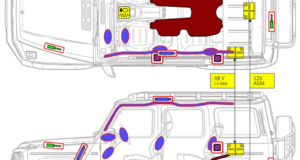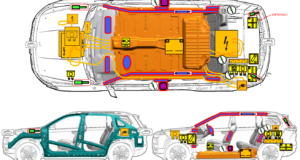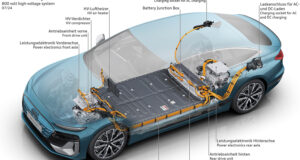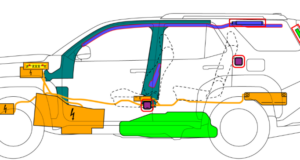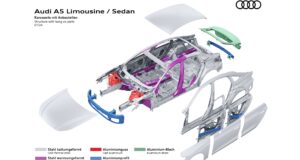Many automakers have invested time and money in training rescuers how to handle a MVA with an electric or hybrid vehicle. The problem I see is this highly publicized Chevy Volt battery fire resulted from a damaged and leaking battery. There is a GM safety protocol to discharge the HV battery which requires a special tool to drain the Volt’s batteries. That tool is not available to dealers until sometime next year. In the mean time, if the battery is leaking or damaged on a Volt a GM team is sent out to drain the battery. The team has only been sent out to crashes a few times with over 5000 Volts on the road.
Let’s focus on the recent Volt fire after a government crash test. Here’s a quote from an article in the Detroit Free Press:
That Volt caught fire because NHTSA did not know to drain the Volt’s battery. The battery case had been punctured, spilling coolant, which caused a short that in turn triggered a fire, GM spokesman Rob Peterson said Monday.
Ok so if the battery is leaking it could catch on fire. Got it! Please tell me that it doesn’t take a masters in engineering to figure out a HV battery leaking coolant (or anything for that matter) is not good. Should it really be a surprise that after three weeks of coolant leaking out of a “charged” battery caught fire? I hope that automakers address leaking batteries in detail in all future Emergency Response Guides!! Or as Jason Emery was quoted in the Detroit Free Press “automakers lack one consistent fire-prevention procedure for electric vehicle batteries”. Jason is a lead electric-vehicle safety instructor for the National Fire Protection Association (NFPA).
If you respond to an MVA with an electric or hybrid vehicle and the battery is leaking stretch a handline and get the patients out. Make sure you follow the proper procedures outlined in the Emergency Response Guides. I would have greater concerns if the Volt caught on fire within an hour of the crash. What are your thoughts?
 Boron Extrication An in-depth look into vehicle extrication and rescues involving today's automobiles
Boron Extrication An in-depth look into vehicle extrication and rescues involving today's automobiles
